In Maputo: 100 journalists from Rádio Moçambique start 3-day training in elections coverage
August 22, 2023
More than 100 communication professionals assigned to Radio Mozambique, from all over the country, are benefiting from a three-day training in Media and Elections, organized by the National Election Commission (CNE), the Technical Secretariat for Electoral Administration (STAE) and Misa-Mozambique, in partnership with the UNDP project entitled "Strengthening Democracy and Electoral Processes in Mozambique 2022-2025"
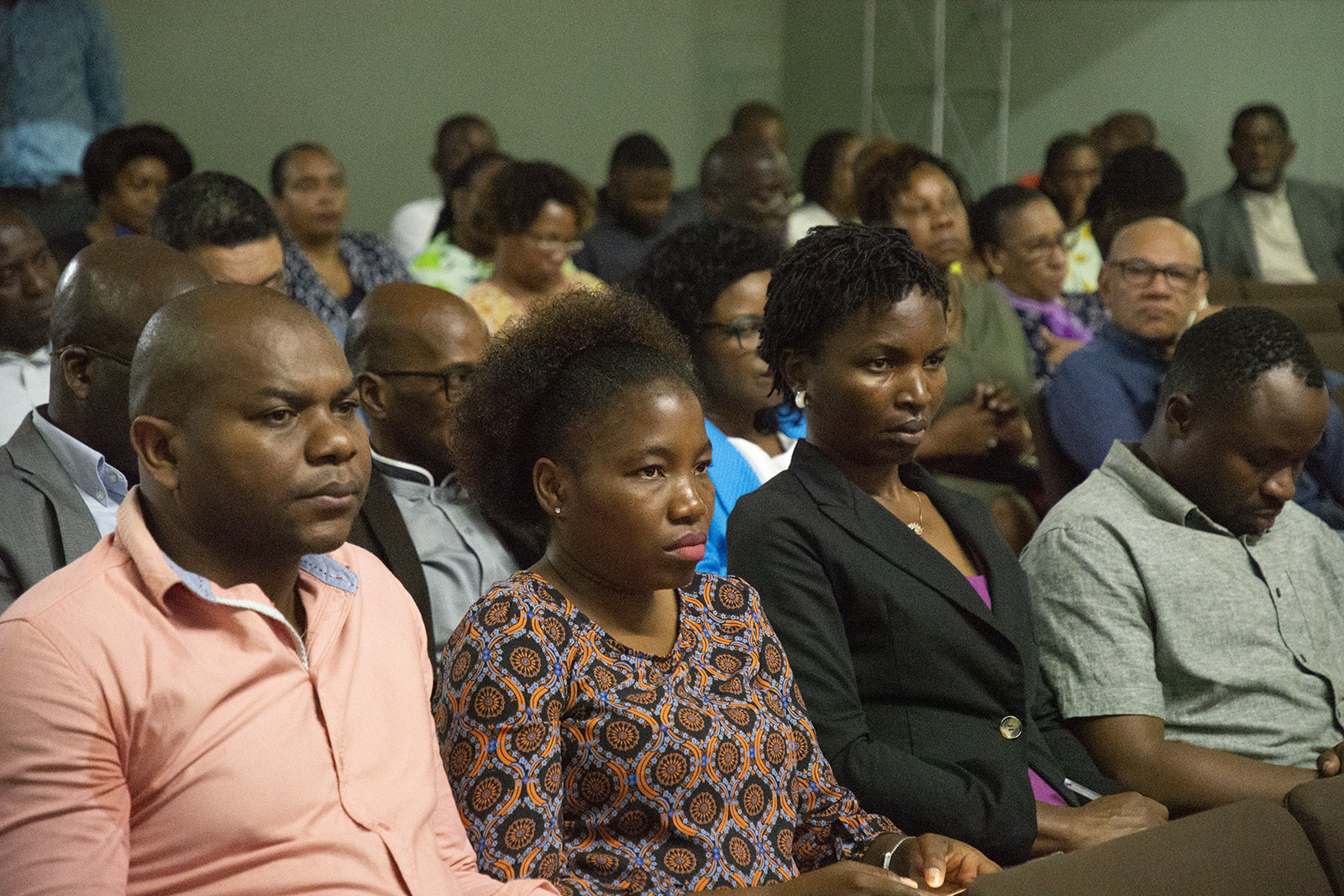
Radio Mocambique journalists listening to the speech of one of the speakers at the opening ceremony.
The training, which has the financial support of the governments of Norway, Canada and Spain, takes place in hybrid mode (face-to-face and online) and involves several professionals of the radio press, from writers, announcers, producers, sound designers and reporters.
Focusing on the upcoming Municipal Elections, the objective of this training is to provide participants with content on the electoral cycle, the code of conduct for the coverage of electoral acts, the role of communication in the management of electoral conflicts, journalistic writing techniques, fact-checking tools, as well as combating fake news and disinformation during electoral processes.
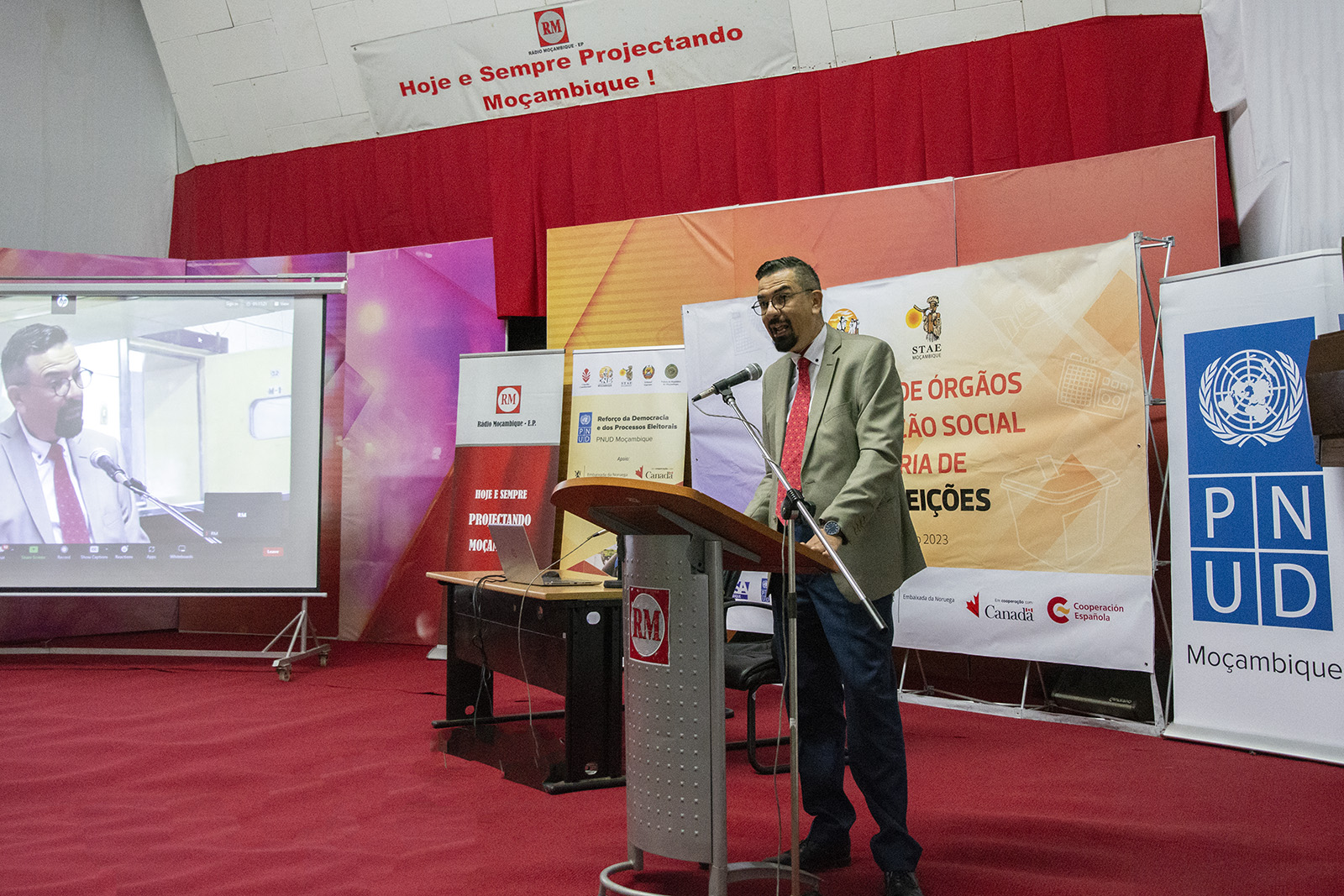
CTA of the UNDP Democracy and Elections Project, Mr. Andres del Castillo, explaining the reasons for a broader training for journalists assigned to Radio Mozambique
Radio is the most comprehensive means of communication
This training is exclusively aimed at journalists and communicators of Radio Mozambique, although this group has been included in previous trainings. Speaking at the opening ceremony, the CTA of the UNDP Democracy and Elections Project, Mr. Andres del Castillo, explained the reasons for broader training for this sector.
"First, radio is the most comprehensive communication. Second, around the world, radio is known as a low-cost and popular medium, which can reach the most remote areas and the most marginalized people, even in emergency situations or after a natural disaster. Finally, it is a medium that has been completely able to adapt to the development of new technologies and mobile devices, being an indispensable means to provide access to information and improve the participation of citizens in political processes," explained Mr. Andres del Castillo.
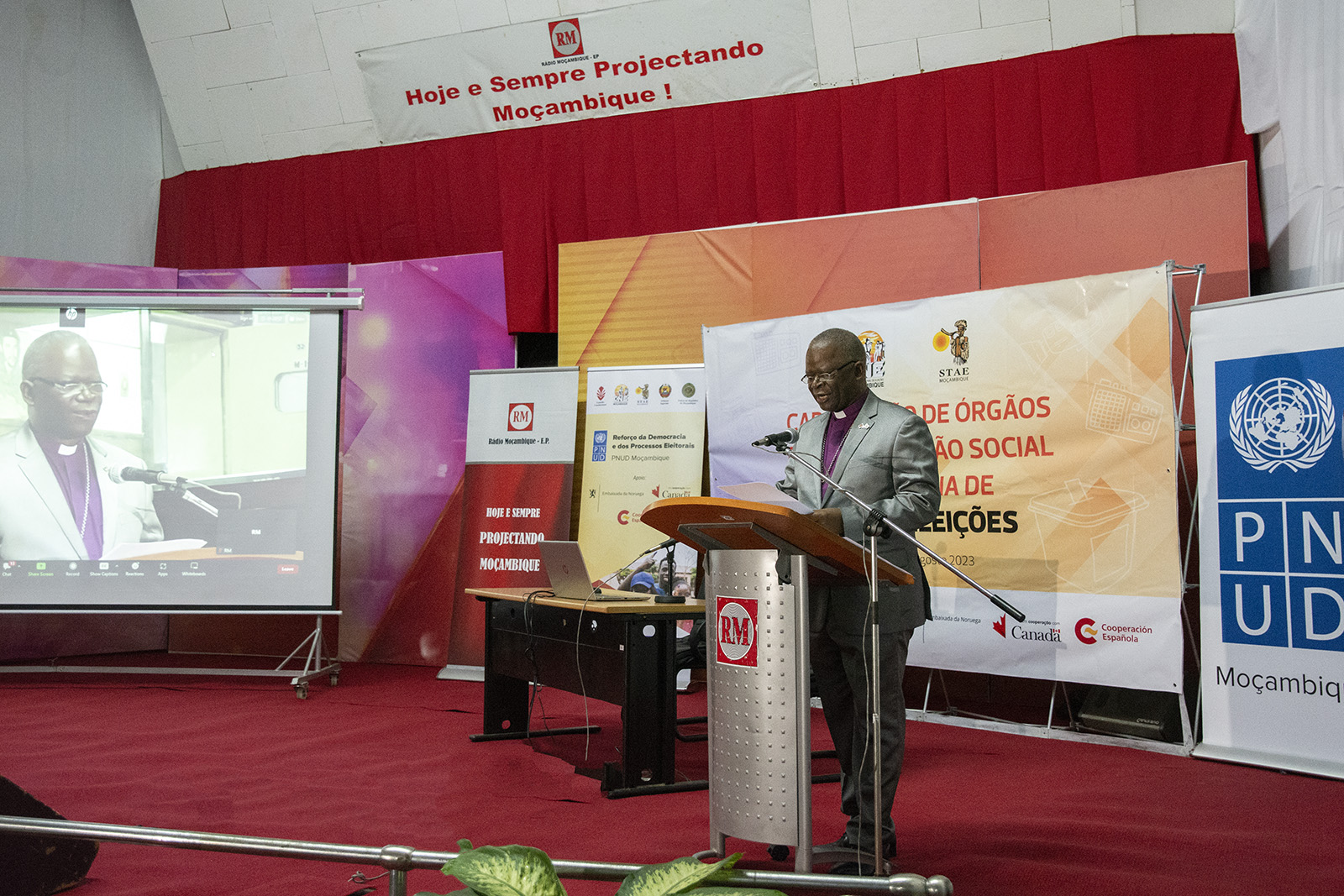
President of the National Election Commission, Dom Carlos Matsinhe.
“The work of the press is essential in any democracy, and it is essential to strengthen its technical and institutional capacity for better coverage of electoral and democratic processes. "With this training that begins today, with the end scheduled for Wednesday, we intend to lay the foundations for an increasingly professional work, on the part of journalists, in the coverage of the elections. For this class of the media is known as the 4th Power [in quotation marks], it has enormous potential to influence the attitudes, actions and reactions of the whole society. Therefore, it is an important part of the communication, awareness and education of citizens about the Electoral Process", said the President of the National Election Commission, Dom Carlos Matsinhe.
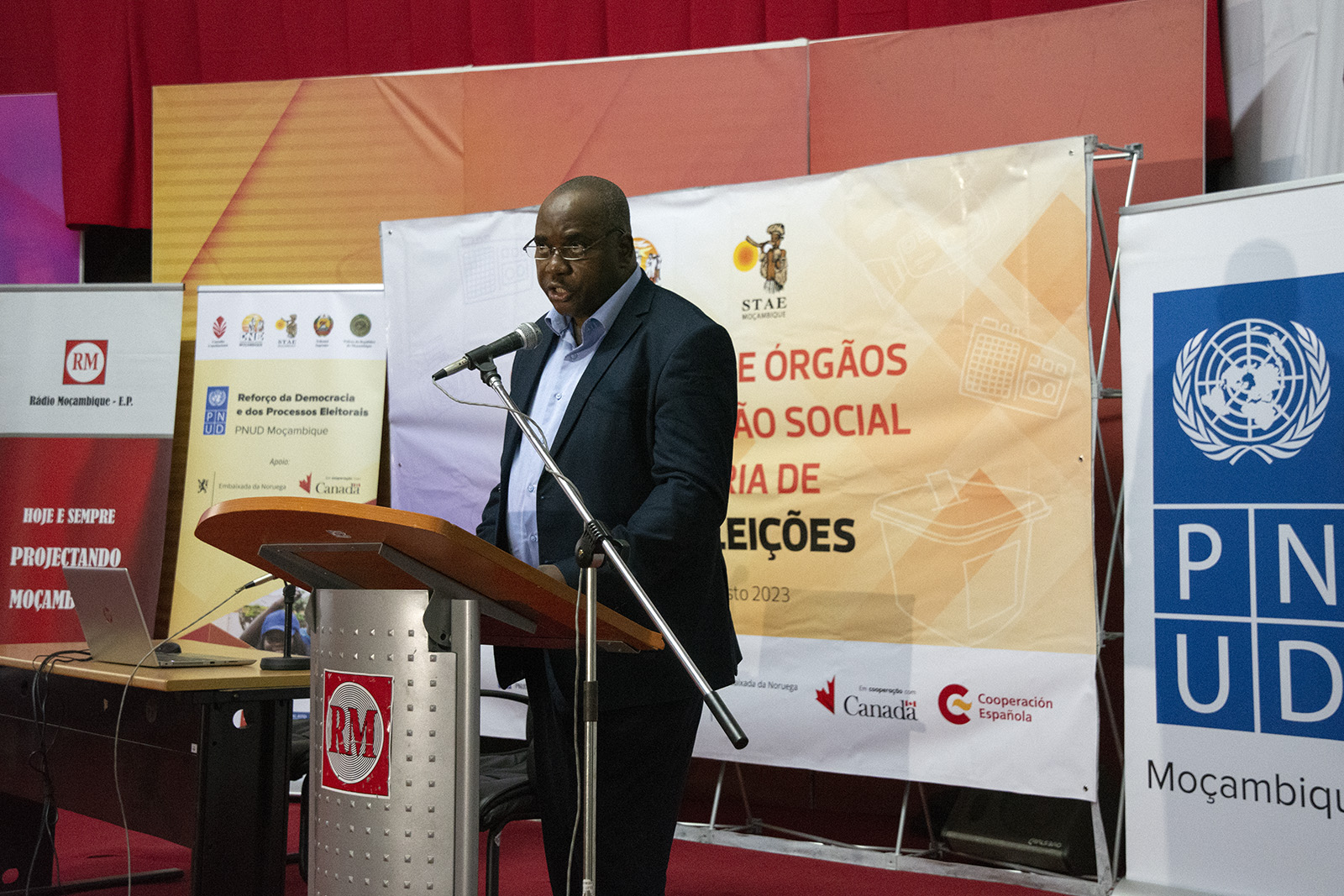
Speaking in the occasion, the Administrator of Radio Mozambique for the Production Area, Mr. Arão Cuambe.
Speaking in the occasion, the Administrator of Radio Mozambique for the Production Area, Mr. Arão Cuambe, who spoke on behalf of the CEO of that media, this training will "raise the technical and ethical level of the new generation of professionals [of Radio Moçambique], thus creating a network of trained and specialized communicators in the coverage of the next electoral process."
"The enhancement of the use of local languages to transmit electoral content remains one of the great bets of Radio Mozambique, as it is the only radio station that broadcasts in 19 Mozambicans, in addition to the Portuguese language and English, with a national coverage of 94% of the territory during the day and 100% at night," said the Administrator.
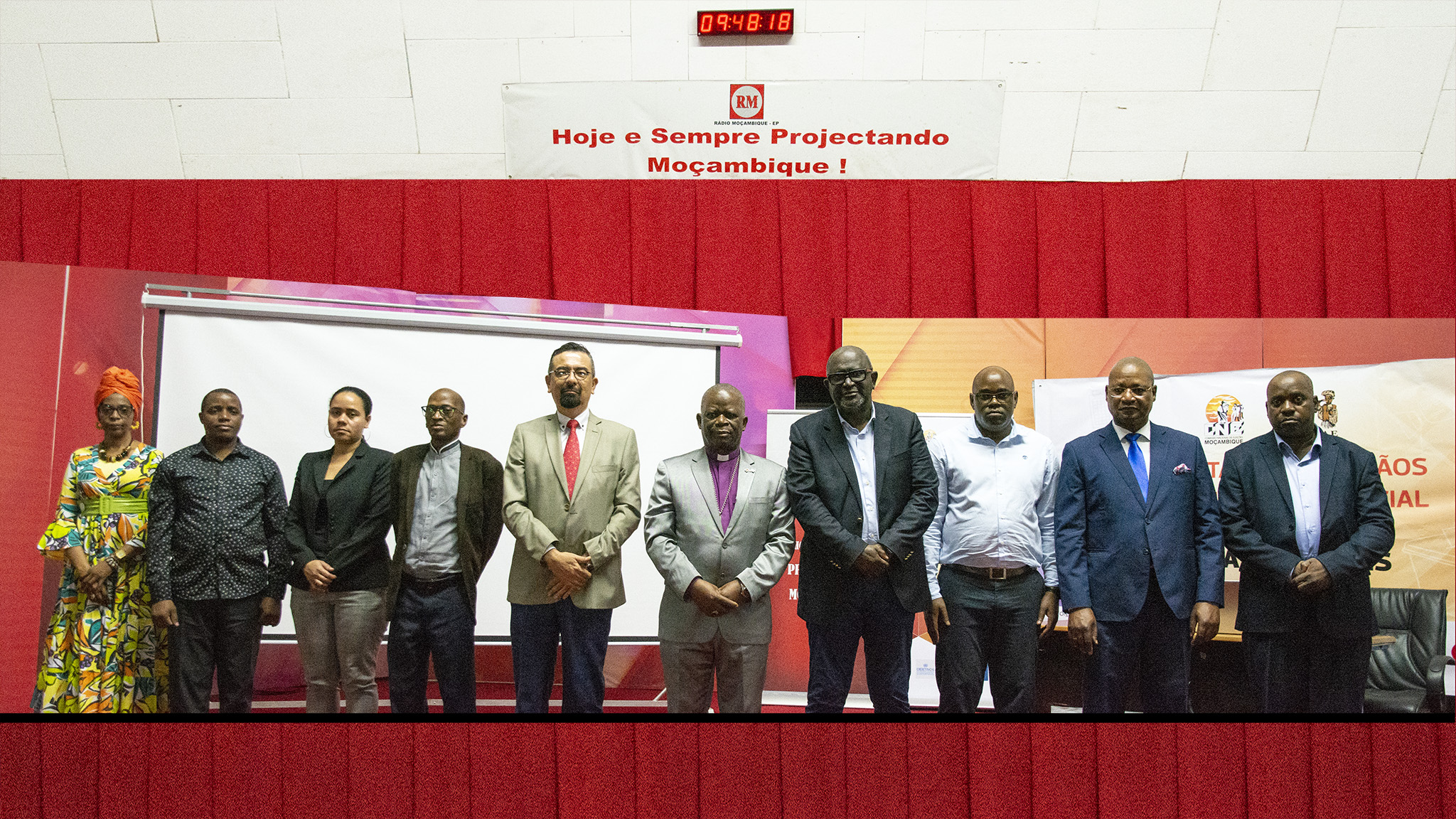
Group photo of the representatives of Radio Mozambique, UNDP, Misa-Mozambique, CNE and STAE
As a continuous activity, this training is part of a series of media and election trainings, which began this year in Marracuene, on the Day of the Mozambican Journalist – celebrated annually on 11 April. Since then, CNE, STAE and MISA-Mozambique, in partnership with the UNDP Democracy and Elections project and support from the governments of Norway, Canada and Spain, have trained just over 500 journalists and communication professionals from all provinces of the country, from various radios, televisions, print newspapers, magazines and digital media.
Notes to editors:
About UNDP:
UNDP works in 170 countries and territories with the aim of eradicating poverty and reducing inequality. We help countries develop policies, leadership skills, partnerships, institutional capacities and build resilience to achieve the Sustainable Development Goals. Our work focuses on three main areas: sustainable development, democratic governance and peacebuilding, and resilience to climate change and disasters.- UNDP's mission and vision: UNDP's mandate is to eradicate poverty, promote democratic governance, the rule of law and inclusive institutions. We advocate for change and connect countries with the knowledge, experience and resources needed to help people build a better life.
About the project:
- Since the first multiparty elections, UNDP has worked closely with Mozambique's electoral and justice bodies, contributing to the consolidation of peace, transparency and effectiveness of electoral processes. Through its Strategic Plan, UNDP underlines the importance of consolidating and strengthening democratic processes and institutional practice in Mozambique. Fundamental to these objectives is the involvement of citizens as key stakeholders in the governance and administration of Mozambique, with the aim of achieving full adherence to the Sustainable Development Goals by 2030.
- • "Strengthening Democracy and Electoral Processes in Mozambique" is a four-year UNDP project designed to strengthen the democratic and electoral system in Mozambique and builds on previous electoral support and lessons learned as the country enters its electoral cycle, including the run-up to the 2023 Local Elections and the 2024 General Elections.
The UNDP Democracy and Elections project is developed based on the formal request of the Government of Mozambique, the recommendation of the Needs Assessment Mission (NAM) conducted by the United Nations in April 2021, the reports of international election observers on the 2019 elections and is aligned with the UNDP Country Programme Document (PCD) and the Government of Mozambique's Five-Year Plan 2020-2024 (Government Five-Year Programme, PQG).
For more information:
Andres del Castillo. Tel +258 850751959, andres.castillo@undp.org - CTA, Democracy and Elections Project
Rochan Kadariya. Tel. +258 842776492, rochan.kadariya@undp.org – Digital Electoral Solutions Specialist
Mateus Fotine. Tel. +258 879880203, mateus.fotine@undp.org - Information and External Relations Officer
END

 Locations
Locations